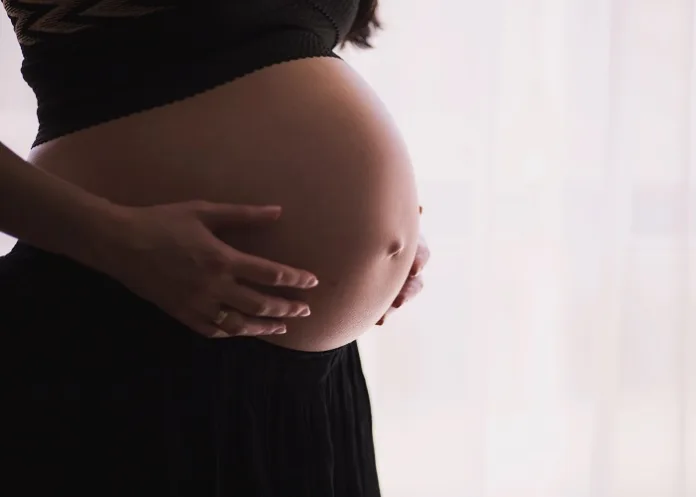As more people use cannabis for recreational purposes, with research showing some dispensaries even recommend it to pregnant women to ease pregnancy symptoms, especially morning sickness, a growing body of literature attests to poor child outcomes if cannabinoids are consumed during pregnancy.
However, the exact effects on the developing foetus have remained blurry – until now – compelling US researchers to recently examine how the timing of cannabis exposure during pregnancy affects foetal development.
Their findings, published in Frontiers in Paediatrics, showed that even when marijuana use occurred only in the first trimester of pregnancy, birth weight was significant reduced by more than 150g on average, according to Dr Beth Bailey, professor and director of population health research at Central Michigan University and senior author of the study.
“If that use continued into the second trimester, newborn head circumference was significantly decreased as well,” she said.
Continued exposure results in largest deficiencies
“These findings are important, as newborn size is one of the strongest predictors of later child health and development,” said Dr Phoebe Dodge, the study’s first author, a recent graduate of the Central Michigan University College of Medicine and an incoming paediatric resident at University Hospitals Rainbow Babies and Children’s Hospital in Cleveland.
MedicalXpress reports that recent work, including the research by Dodge et al, has shown significant effects of cannabis use on newborn size.
“Size deficits were largest among newborns exposed to marijuana throughout gestation,” said Bailey. The babies born after continued in-utero exposure were nearly 200g lighter, and their head circumference was nearly 1cm less than that of babies who had not been exposed.
Pregnancy cannabis use did not significantly predict newborn length in this study.
The effects the scientists observed have also shed light on patterns of use. Their study showed that occasional use, such as for first trimester morning sickness, may reduce foetal growth in the same way as continued use throughout pregnancy. The same is true for other use in early stages, including cases when someone uses cannabis not knowing they are pregnant.
Quitting before pregnancy is best
The authors pointed out that they did not have information about how much or how often participants used cannabis. Their results were based on whether women did or did not use it at certain times in pregnancy. Therefore, the study could not establish if there were a connection between heavy use and more pronounced outcomes in newborn growth.
More studies are needed to determine whether timing or amount of use is most important when it comes to effects on newborn size, they wrote.
“The best recommendation is that women should quit marijuana before becoming pregnant,” Dodge said. However, quitting as soon as possible after getting pregnant is the second-best option to avoid long term adverse health and developmental outcomes.
Study details
The impact of timing of in utero marijuana exposure on foetal growth
Phoebe Dodge, Katherine Nadolski, Haley Kopkau, Victoria Zablocki, Kaya Forrestal and Beth Bailey.
Published in Frontiers in Paediatrics on 16 May 2023
Objective
To examine whether timing of in utero marijuana exposure independently and negatively impacts foetal growth, and if these effects are global or specific to certain growth parameters.
Study design
The two study groups were marijuana users (N = 109) and a randomly selected control group of biochemically verified non-users (n = 171). Study data were obtained via manual abstraction of electronic medical records.
Results
After control for significant confounders, regression results indicated significant (p < .05) decrease in newborn weight after first trimester marijuana exposure only (−154 g) and following marijuana exposure throughout gestation (−185 g) compared to controls. There were also significant deficits in head circumference following marijuana exposure in the first and second trimester only (−.83 cm) and marijuana exposure throughout pregnancy (−.79 cm) compared to controls. Newborn length was not significantly predicted by marijuana exposure.
Conclusions
Timing of marijuana exposure appears to play a key role in specific foetal growth deficits, with exposure throughout gestation most detrimental. However even first trimester exposure may result in decreased weight. Timing and amount of use could be confounded in this study as those who quit early in pregnancy may have been lighter users than those who continued throughout pregnancy. More research is clearly needed to better understand the role of amount and timing of in utero marijuana exposure in predicting different aspects of foetal growth, however, this study suggests that women should be encouraged to avoid marijuana use at any point in pregnancy.
See more from MedicalBrief archives:
Pregnancy – Cannabis use linked to autism; alcohol raises miscarriage risk
Cannabis use in pregnancy boosts risk of child sleep problems
Prenatal cannabis exposure linked to adolescent mental health issues
Effect on infants from mothers’ multiple substance use in pregnancy – SA study

